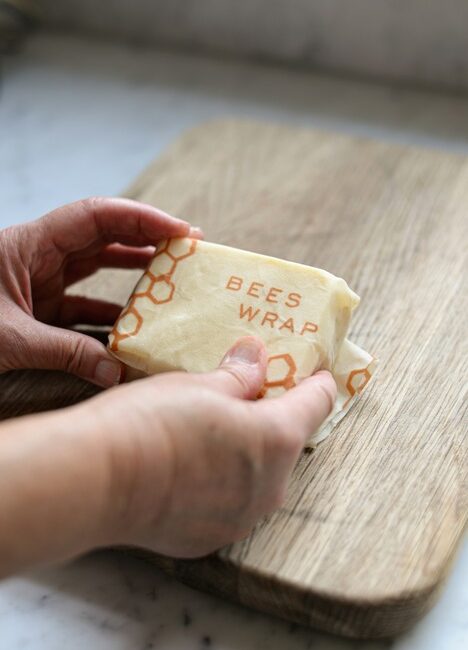Why Choose Eco-Friendly Kitchen Tools?
When it comes to making a positive environmental impact, every small step counts. Eco-friendly kitchen tools are designed to minimize waste, reduce plastic use, and often have a longer lifespan than their non-sustainable counterparts. These tools are made from renewable resources, recycled materials, and are often biodegradable or recyclable at the end of their life cycle. Let’s explore some categories of these sustainable kitchen tools and how they can transform your cooking experience.
Essential Eco-Friendly Kitchen Tools
Switching to eco-friendly kitchen tools can be easy and fun. Here are some essential tools that you can start with:
Reusable Food Storage
Plastic wrap and single-use plastic bags are out; reusable food storage is in! Opt for silicone food storage bags, beeswax wraps, and glass containers. These kitchen tools not only keep your food fresh but also reduce the need for disposable plastics.
Beeswax Wraps
Beeswax wraps are a fantastic alternative to plastic wrap. They are made from cotton fabric coated with beeswax, jojoba oil, and tree resin. They’re perfect for wrapping sandwiches, covering bowls, and keeping your produce fresh. Plus, they are washable and reusable, lasting up to a year with proper care.
Sustainable Utensils
Choosing utensils made from sustainable materials like bamboo, stainless steel, or recycled plastic can significantly cut down on waste. Bamboo utensils are especially popular because bamboo grows quickly and doesn’t require pesticides or fertilizers.
Bamboo Cutting Boards
Bamboo cutting boards are durable, easy on your knives, and naturally resistant to bacteria. They come in various sizes and styles, making them a versatile addition to your kitchen.
Eco-Friendly Cookware
Non-stick pans and pots often contain harmful chemicals that can leach into your food. Instead, consider using cast iron, stainless steel, or ceramic cookware. These materials are long-lasting, safe, and can be recycled.
Cast Iron Skillets
Cast iron skillets are a favorite among eco-conscious cooks. They retain heat well, can be used on the stove or in the oven, and with proper care, they can last a lifetime. They also add a little bit of iron to your food, which can be a nice bonus!
Compost Bin
A countertop compost bin is a great way to collect food scraps and compostable waste. Look for bins made from stainless steel or recycled plastic, with filters to control odors. Composting reduces landfill waste and provides nutrient-rich soil for your garden.
Reusable Produce Bags
Instead of using single-use plastic bags for your fruits and vegetables, switch to reusable produce bags. These bags are often made from organic cotton or mesh and can be washed and reused multiple times.
Wooden Dish Brushes
Replace plastic dish sponges with wooden dish brushes. These brushes often have natural bristles made from plant fibers and can be composted at the end of their life. They are durable and can be used for various cleaning tasks in the kitchen.
Stainless Steel Straws
Ditch single-use plastic straws for stainless steel straws. They are reusable, easy to clean, and come with cleaning brushes. They are great for smoothies, iced coffee, and other beverages.
Silicone Baking Mats
Silicone baking mats are a fantastic alternative to parchment paper and aluminum foil. They are reusable, non-stick, and can be used for baking cookies, roasting vegetables, and more. They reduce waste and save money in the long run.
Cloth Napkins
Switching to cloth napkins instead of paper ones can significantly reduce waste. Cloth napkins are washable, reusable, and add a touch of elegance to your dining table. Look for napkins made from organic cotton or linen.
Glass Measuring Cups and Bowls
Opt for glass measuring cups and bowls instead of plastic ones. Glass is durable, non-toxic, and can be recycled at the end of its life. It also doesn’t absorb odors or stains.
Eco-Friendly Dish Soap
Choose eco-friendly dish soap that is biodegradable and free from harsh chemicals. Some brands offer refillable options to reduce plastic waste. Pair it with a wooden dish brush for a completely green dishwashing routine.
Biodegradable Sponges
Biodegradable sponges made from natural materials like cellulose or coconut fibers are a great alternative to traditional plastic sponges. They are compostable and break down naturally.
Recycled Paper Towels
If you still need to use paper towels, opt for those made from 100% recycled paper. They have a lower environmental impact and are often available in bulk to reduce packaging waste.
Upcycled Kitchen Decor
Look for kitchen decor items made from upcycled materials, such as cutting boards made from reclaimed wood or bowls made from recycled glass. These items add a unique touch to your kitchen while supporting sustainable practices.
Switching to these sustainable kitchen tools not only helps reduce your environmental footprint but also promotes a healthier and more eco-friendly lifestyle. Happy green cooking!
Simple Recipes Using Eco-Friendly Kitchen Tools
Switching to eco-friendly kitchen tools doesn’t mean you have to change your cooking style. Here are a few simple recipes that highlight these tools:
Fresh Herb Pesto
Using your bamboo cutting board and stainless steel knife, chop a bunch of fresh basil, parsley, and mint. In a cast iron skillet, lightly toast some pine nuts. Blend the herbs, pine nuts, garlic, olive oil, and Parmesan cheese in a food processor. Use your beeswax wrap to store any leftover pesto in the fridge.
One-Pot Vegetable Stir-Fry
Heat your cast iron skillet over medium heat. Add a splash of olive oil, then toss in your favorite veggies: bell peppers, broccoli, snap peas, and carrots. Stir-fry until tender. Serve over rice or noodles cooked in your stainless steel pot. Use your silicone food storage bags to save any leftovers.
Oatmeal Energy Bites
In a large bamboo mixing bowl, combine rolled oats, peanut butter, honey, and dark chocolate chips. Roll into bite-sized balls and store in a glass container or reusable silicone bag in the fridge for a quick and healthy snack.
FAQ About Eco-Friendly Kitchen Tools
Q: What makes kitchen tools eco-friendly?
A: Eco-friendly kitchen tools are typically made from sustainable, renewable, or recycled materials. They are designed to reduce waste, have a longer lifespan, and are often biodegradable or recyclable.
Q: How do I care for my bamboo utensils?
A: Bamboo utensils should be hand-washed with mild soap and water. Avoid soaking them and never put them in the dishwasher. To maintain their quality, you can periodically rub them with food-safe mineral oil.
Q: Are silicone food storage bags safe for all types of food?
A: Yes, high-quality silicone food storage bags are safe for all types of food. They are non-toxic, BPA-free, and can be used in the freezer, microwave, and dishwasher.
Q: Can I use beeswax wraps for hot food?
A: Beeswax wraps are not suitable for hot food as the heat can melt the beeswax. They are best used for room temperature or cold foods.
Q: How do I clean and store my cast iron skillet?
A: After each use, clean your cast iron skillet with hot water and a stiff brush. Avoid using soap, which can strip the seasoning. Dry it thoroughly and apply a thin layer of oil to prevent rusting. Store it in a dry place.
Final Thoughts
Switching to eco-friendly kitchen tools is a great way to start living a more sustainable lifestyle. These tools not only help the environment but can also enhance your cooking experience. From reusable food storage options to durable cookware, making the switch to eco-friendly kitchen tools is a win-win for you and the planet. So, let’s all do our part and cook up some sustainable solutions!
For more look here
Chef Ethan
Meet Chef Ethan Mitchell, the brilliant male culinary mind behind LoveKitchenToday.com. With a blend of innovative techniques and timeless flavors, Chef Ethan crafts culinary experiences that captivate the senses and celebrate the art of cooking. Explore his recipes to embark on a flavorful journey that redefines your love for the kitchen.
Other Articles



